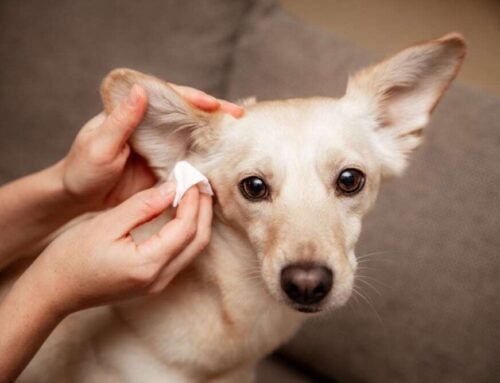As golden pollen fills the springtime air, your allergies may go haywire, causing you to sneeze and have itchy, watery eyes. While you walk around in an antihistamine-induced fog, your pet may also be suffering from springtime allergies. However, your furry friend’s allergies likely manifest differently than your own. Identifying allergies in pets can be challenging, but certain signs are significant. Our Animal Medical Hospital of Naples team describes 10 telltale signs that indicate your pet might be experiencing an allergy.
#1: Excessive scratching and itching in pets
The most common pet allergy signs are excessive scratching, licking, and chewing. Although your pet may occasionally scratch or chew at an itchy spot, excessive scratching—to the point of seeming obsessive—is often an allergy’s number-one sign in pets. If you notice your pet constantly scratching, particularly their ears, paws, face, or belly, they may have an environmental allergy.
#2: Chronic ear infections in pets
A pet who has an allergy can experience a compromised skin barrier, which leads to ongoing skin irritation and inflammation. A broken skin barrier, combined with the moist, dark environment within your pet’s ear flaps, can result in overwhelming yeast and bacterial growth that leads to infections. If the skin irritation and inflammation caused by an allergy are not addressed, your pet can experience chronic ear infections. Pets who frequently shake their head, scratch their ears, or exhibit reddened ears could have an environmental or food allergy.
#3: Skin irritation and inflammation in pets
Allergies can manifest as a rash, hives, or hotspots on your pet’s skin. These areas may appear red and inflamed and are often sensitive to the touch. If your pet develops any skin abnormalities, have our Animal Medical Hospital of Naples veterinarian examine them.
#4: Paw licking or chewing in pets
A pet with an allergy may compulsively lick or chew their paws in an attempt to relieve itchiness and discomfort. Excessive paw licking can lead to irritation, inflammation, and secondary infections, so you must have our team address the underlying cause promptly.
#5: Hair loss in pets
An allergic reaction can contribute to hair loss or a thin coat as your pet licks, chews, and scratches at irritated skin. If you notice patches of fur missing or a decline in the overall quality of your pet’s coat, an allergy may be to blame.
#6: Gastrointestinal issues in pets
While uncommon, pets can develop food allergies that, not only cause skin issues, but can also lead to vomiting, diarrhea, or excessive flatulence. Pay attention to any changes in your pet’s eating habits or bowel movements, as these could indicate an allergic reaction to certain proteins or other ingredients in their food.
#7: Watery eyes in pets
Like people, pets can experience allergic reactions that affect their eyes. Watch for redness, irritation, an elevated third eyelid, or excessive discharge, as these could be environmental allergy signs in your pet. Your four-legged friend may also paw at their eyes or rub their face to try to alleviate the itching.
#8: Chronic sneezing in pets
Persistent sneezing in pets can indicate that your pet is allergic to pollen, dust mites, or mold. If your pet exhibits these signs, especially during certain times of the year or in specific environments, an allergy could be the culprit. An affected pet can also develop reverse sneezing, which sounds similar to a gag followed by a snort. Sinus drainage down the back of your pet’s throat typically causes reverse sneezing.
#9: Behavioral changes in pets
An allergy can make a pet feel uncomfortable and irritable, leading to behavioral changes. Keep an eye out for restlessness, agitation, or lethargy in your pet, as these could indicate they have an underlying allergy that requires attention.
#10: Seasonal allergy signs in pets

Pay attention to any seasonal patterns in your pet’s allergy signs. If you notice that your pet’s allergy signs flare up during certain times of the year, such as spring or fall, they may have a seasonal allergy to pollen or grass.
Recognizing your pet’s allergy signs is the first step toward providing them with relief and improving their quality of life. If you suspect that your pet has an allergy, schedule an appointment with our Animal Medical Hospital of Naples team for a thorough evaluation and personalized treatment plan.







Leave A Comment